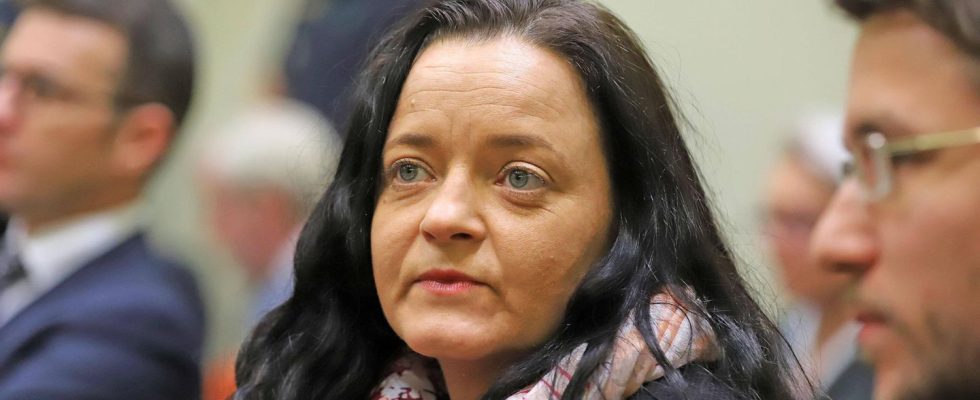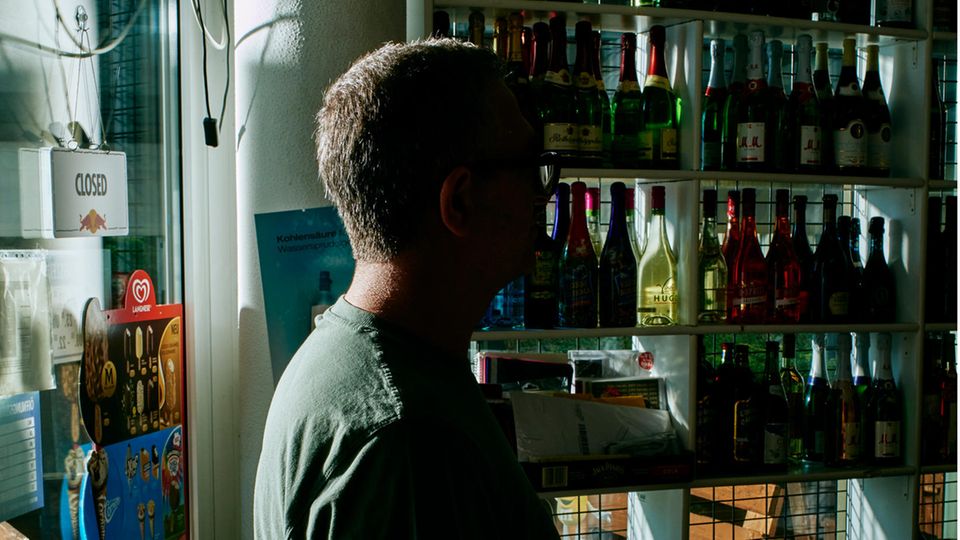According to lawyer
Beate Zschäpe admits complicity in the NSU murder series: “Could have prevented the first murder from becoming a series”
Beate Zschäpe testified today before the Bavarian NSU investigative committee and for the first time did not reply in writing (archive)
© Eibner / Imago Images
Five years after the end of the NSU trial and for the first time ever, the NSU terrorist Beate Zschäpe answered questions from an official committee – for many hours. It becomes clearer than ever before. But many questions remain unanswered.
According to her lawyer, the convicted right-wing terrorist Beate Zschäpe has admitted to the Bavarian NSU investigative committee more clearly than ever before that she was partly to blame for the series of murders committed by the “National Socialist underground”. “She admitted her complicity in the murders much more intensely today than in the trial,” Mathias Grasel told the German Press Agency after Zschäpe was questioned for hours in Chemnitz prison.
“It remains the same: there was no active participation, neither in the preparation nor in the implementation,” emphasized Grasel. “But she said very clearly several times today: If I had acted and reacted differently after the first murder, nothing else would have happened.”
The committee chairman Toni Schuberl (Greens) also reported on Monday that Zschäpe’s admission of guilt had a “new quality”. Zschäpe said that she clearly saw the guilt in herself, said Schuberl: “As if she had pulled the trigger herself”. Zschäpe said that she did not want the deeds – but also that they were only possible because of her. And that she could have prevented the crimes if she had turned herself in when she found out about the first murder.
In the NSU trial, Beate Zschäpe only replied in writing
Grasel and Schuberl also reported from Zschäpe’s statement that they knew about the spying on potential victims. The criteria were: “Foreign-sounding name, preferably Turkish, and a good chance of escape,” said Grasel. However, she was not involved in the spying itself and in the planning of the murders.
The “National Socialist Underground” (NSU) was a terrorist cell consisting of Zschäpe, Uwe Mundlos and Uwe Böhnhardt, which from 2000 onwards committed ten murders undetected for years all over Germany, five of them in Bavaria. Their victims were nine traders of Turkish and Greek origin and a German policewoman. Mundlos and Böhnhardt also carried out two bomb attacks in Cologne, injuring dozens. The two killed each other in 2011 to avoid being arrested – only then was the NSU exposed. Zschäpe, the only survivor of the trio, was sentenced to life imprisonment in 2018 after more than five years of trial – as an accomplice, even if there is no evidence that she was at a crime scene herself.
Zschäpe was questioned by the Bavarian state parliamentarians in a non-public session throughout Monday. It was the first time she had spoken out since the end of the trial, and the first time Zschäpe had answered questions directly. In the NSU trial, she only made statements in writing and responded in writing to questions and only spoke twice herself – including in her closing words.
Grasel quoted from Zschäpe’s statement to the committee members: “I could have prevented the first murder from becoming a series. I would have had the opportunity and didn’t use it.” According to Grasel, Zschäpe said: “I wrongly put the lives of Uwe Mundlos and Uwe Böhnhardt above the lives of the victims.”
It is the second NSU investigative committee
In the NSU trial, Zschäpe admitted that she knew about her friends’ bank robberies and that she set fire to the trio’s last escape apartment in Zwickau, Saxony. But she only found out about the murders and attacks afterwards. “I feel morally guilty that I could not prevent ten murders and two bombings,” she added at the time. She later said in a brief statement that she regrets her “misconduct” and that she condemns what Mundlos and Böhnhardt “did to” the victims.
The Munich Higher Regional Court, on the other hand, followed the argumentation of the federal prosecutor’s office: Zschäpe very well “knew everything, supported everything and helped to control and achieve things in her own way”. The Federal Court of Justice (BGH) rejected an appeal by Zschäpe in August 2021. She has been serving her sentence in Chemnitz JVA since 2019.
The aim of the second NSU investigative committee in the state parliament is, among other things, to clarify possible connections of the NSU to the neo-Nazi scene in Bavaria. Here, however, the committee hoped in vain for answers from Zschäpe. Schuberl reported that Zschäpe denied having been to Nuremberg several times. Grasel quoted Zschäpe as saying: “Maybe Mundlos knew someone.” The deputy committee chairman Holger Dremel (CSU) summarized Zschäpe’s statement as follows: There were no accomplices in Bavaria. The SPD, among others, immediately expressed doubts about Zschäpe’s statement. But the former Bavarian Minister of the Interior Günther Beckstein (CSU) had recently stated that he was firmly assuming that there would be helpers at the crime scenes.
This message has been updated.


